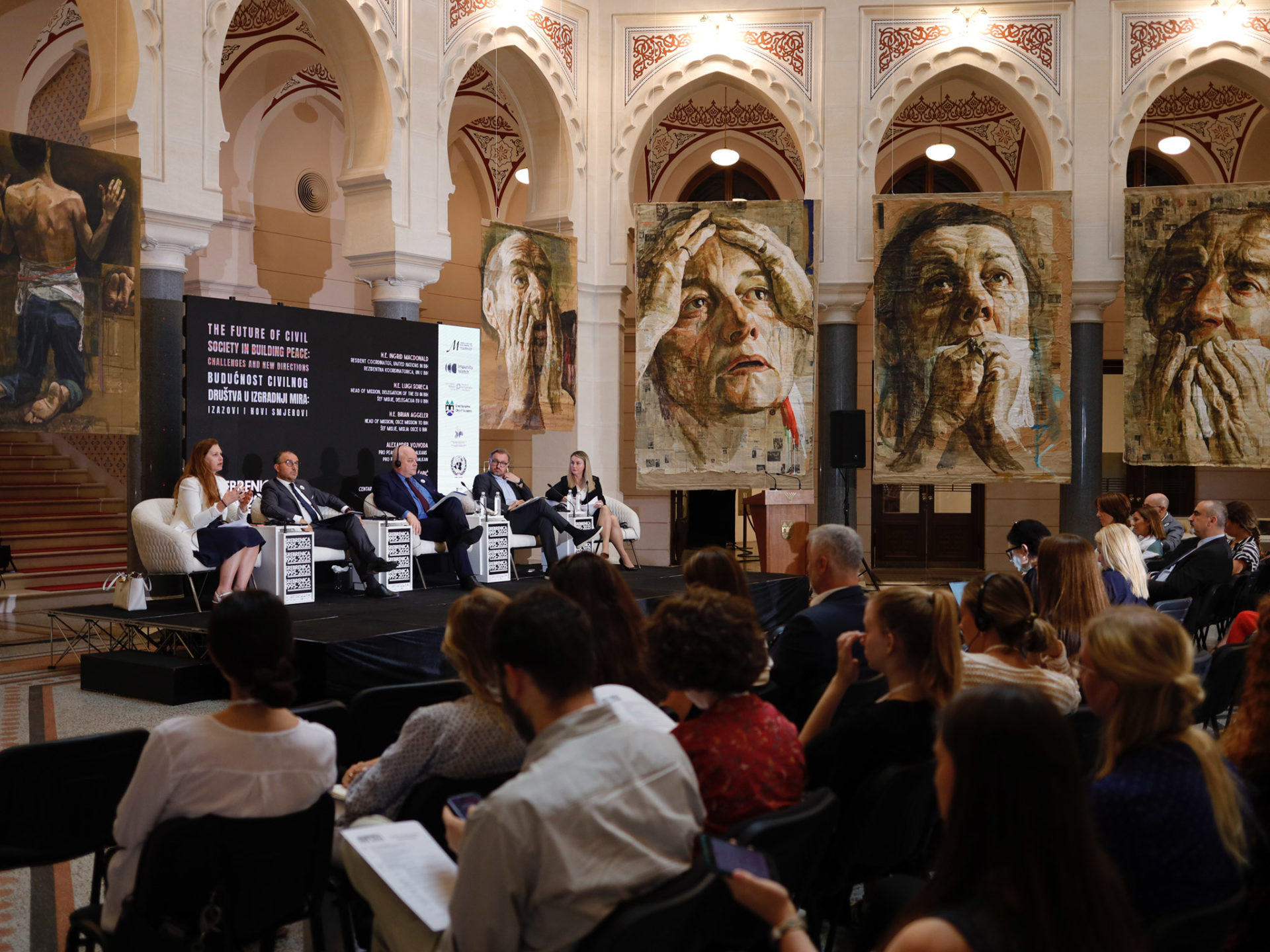
Dealing with the past in Bosnia and Herzegovina (BiH) is possible only by confronting the truth.
International and national courts have established the facts, and the denial of these facts is an attack not only on memory but on victims, justice, and the rule of law. The European Union (EU), the United Nations (UN), the Organization for Security and Cooperation in Europe (OSCE), and the international organization Pro Peace continue to work toward transitional justice. By investing in youth, women, survivors, the media, and civil society, we can facilitate the process of historical reckoning, thereby expediting BiH’s path to EU and NATO membership.
These are some of the conclusions reached during “Srebrenica 1995-2025: Dealing with the Past,” an international conference held on July 8th at Sarajevo City Hall. This conference was jointly organized by the Post-Conflict Research Center (PCRC), the City of Sarajevo, the Sarajevo Information Centre on the International Criminal Tribunal for the former Yugoslavia (ICTY), the Movement of Mothers of the Srebrenica and Žepa Enclaves, the International Residual Mechanism for Criminal Tribunals, the Western Balkans Coalition for Genocide and Mass Atrocity Crimes Prevention (CGMAP), and the Dutch organization Impunity Watch.
“The past is painful, but 30 years later, it’s obvious that genuine healing can only be achieved by facing the truth. So, broad-based efforts to deal with the past have to be seen as a national priority across the political spectrum, instead of a burden to be avoided,” said Ambassador Brian Aggeler, Head of the OSCE Mission to BiH.
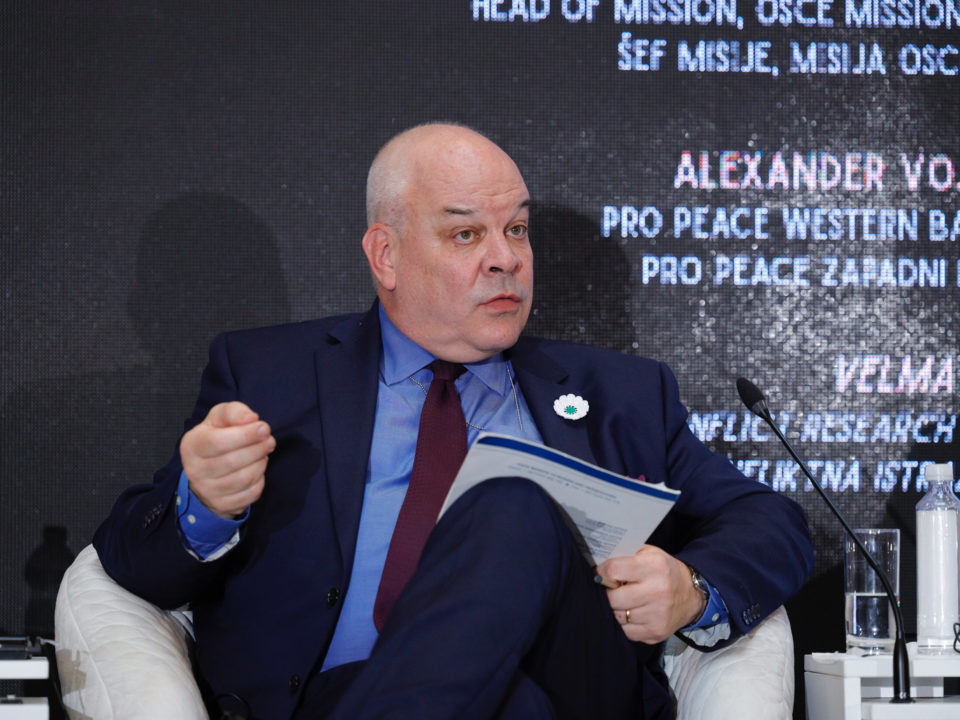
The panel “The Future of Civil Society in Building Peace: Challenges and New Directions,” was moderated by PCRC Founder and President Velma Šarić, who emphasized that peacebuilding must be an everyday, multidimensional, and interdisciplinary process.
Ingrid Macdonald, resident coordinator of the UN in BiH, explained that the UN works with various government departments—in BiH, with 134 different institutions. She emphasized that real progress requires across-the-board, action where leading voices for peace, including women, have a key role. She highlighted BiH women’s involvement in peacebuilding as one of the best examples in the world.
Investing in Yong People as Future EU Citizens
Ambassador Luigi Soreca, head of the EU Delegation to BiH, emphasized that BiH’s membership in the EU requires the effort of the entire society, including the civil sector, business, and government.
“Civil society is an integral part of what we conceive of as a process of including a country into the European Union. I’m looking very much forward to starting negotiations. I was very happy to be able to do it in Albania, where we have seen the transformative power of negotiations, and I would really like to be able to see this happening here,” said Ambassador Soreca.
He explained that the EU includes civil society in policy development through discussion platforms, with consultations with media representatives and non-governmental organizations taking place before each annual European Commission report is drawn up.
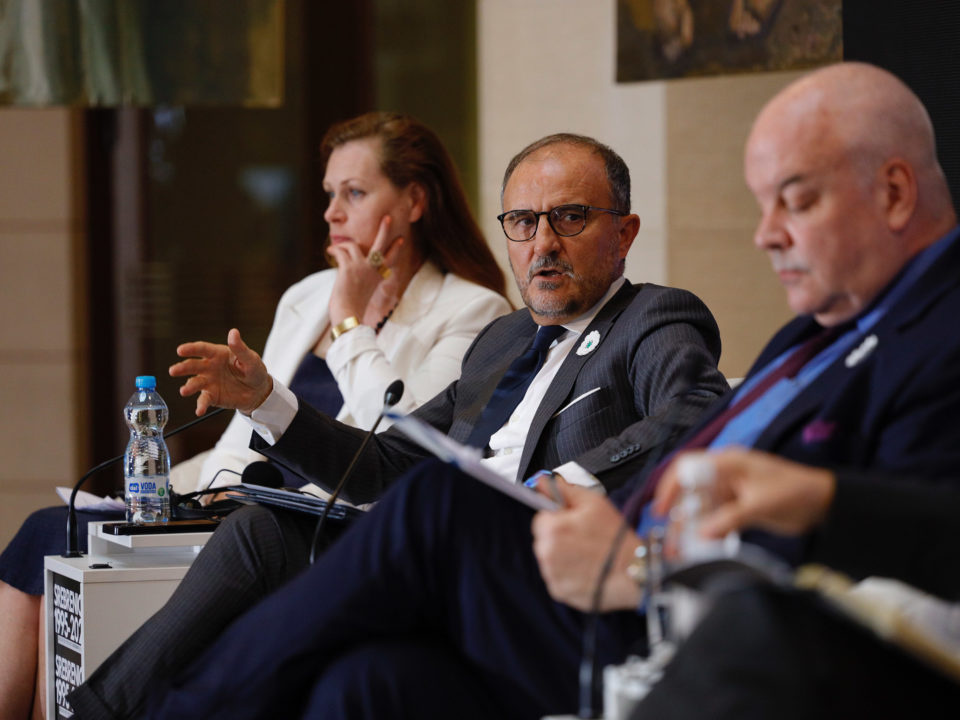
He noted that the EU is the biggest donor to BiH, and that this aid does not just go to the authorities or businesses but creates an environment in which society can find its place as future members of the EU.
“I personally believe that investing in young people is the best thing that the European Union can do. They are future citizens, initiators of change, and we must help them to use their strength,” said Ambassador Soreca.
Among the projects supported by the EU is the State of Peace Youth Academy, implemented with PCRC, which brings together young people from all over the region.
In the process of dealing with the past, Ambassador Aggeler emphasized that support is more important than ever, and that it is necessary to strengthen the capacities of institutions, independent media, and civil society actors who fight against atrocity denial and cooperate with the judiciary for the consistent application of the law.
Mothers of Srebrenica as a Global Example of Courage
“The Mothers of Srebrenica not only ensured that perpetrators were held accountable at the highest levels of government and international criminal law, but their bravery in bringing those cases forward and giving testimony has changed the world, making women everywhere safer today,” said Macdonald.
She added that the UN has an important Women, Peace, and Security agenda, and that BiH is the only country in Europe that has access to this program, which facilitates further strategic peacebuilding investment in cooperation with the government, local partners, and civil society.
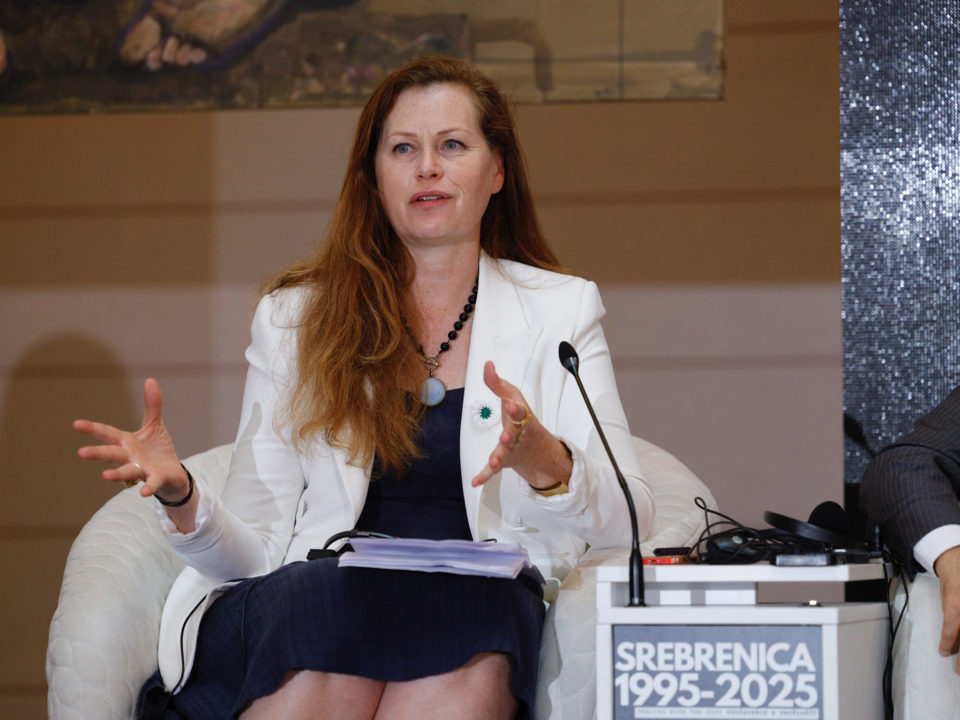
Macdonald also emphasized the importance of youth voices but warned of the need for a realistic approach: “Young people are also a very diverse group. In Bosnia and Herzegovina, there’s an enormous amount of intergenerational trauma and PTSD that is unresolved.”
“International justice is important, but without reconciliation—legitimate reconciliation, where people talk, and they talk about their pain and they look for a future that they themselves own—it gets buried,” she stressed.
Alexander Vojvoda, Western Balkans adviser of the Pro Peace organization, said that the Srebrenica genocide and the breakup of Yugoslavia were key events for the transformation of the conflict. He stressed the importance of looking at the legacy of previous projects and universalizing the lessons learned throughout the region, including in Serbia, North Macedonia, and Kosovo.
“It’s important that we, as a German organization, take on the responsibility of conveying experiences from the region to Germany and lobbying for them at the EU level,” added Vojvoda.
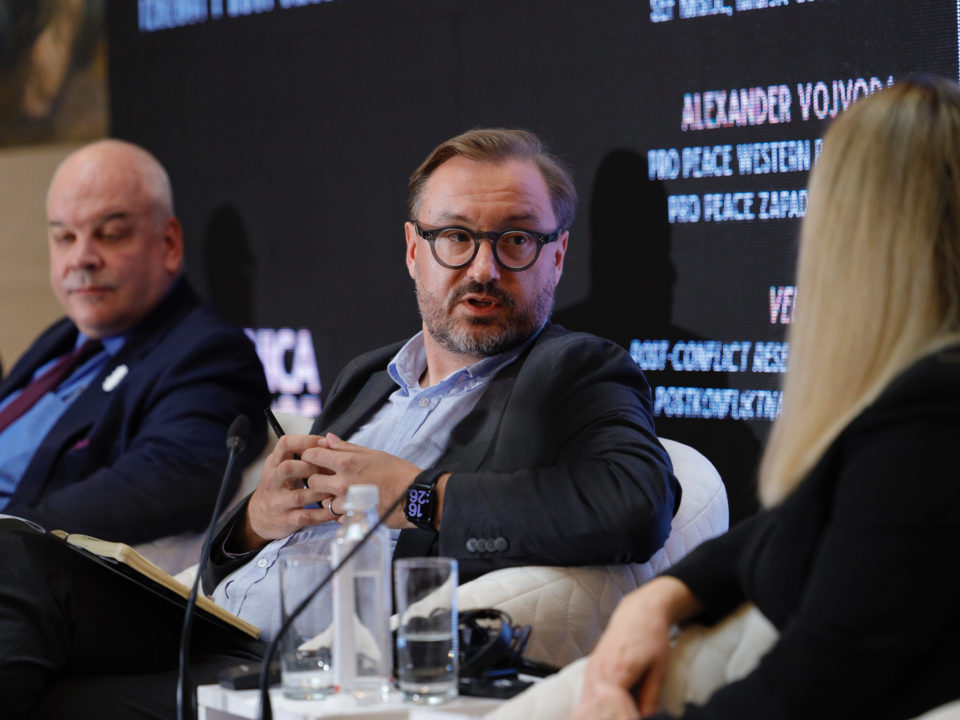
A Call for a Joint Fight Against Injustice
The panel was followed by a video broadcast of the genocide commemoration at the UN headquarters in New York.
Robert Skinner from the UN Global Communications Department expressed his respect and admiration for the families of the victims and survivors, recalling the adoption of the UN General Assembly Resolution declaring July 11th the International Day of Remembrance and Commemoration of the Srebrenica Genocide.
“We commit never to forget the up to 8,000 boys and men who were tortured and murdered, and the women and girls forcibly displaced, raped, and killed,” Skinner said.
Munira Subašić, president of the Movement of the Mothers of Srebrenica and Žepa Enclaves, said from New York: “When you kill a mother’s child, you kill a part of her. It’s difficult to live without that part. The world and Europe are unfair to us Muslims in BiH. After 30 years, they have learned nothing. I call for a joint fight against injustice, the glorification of war criminals, and hatred that kills.”
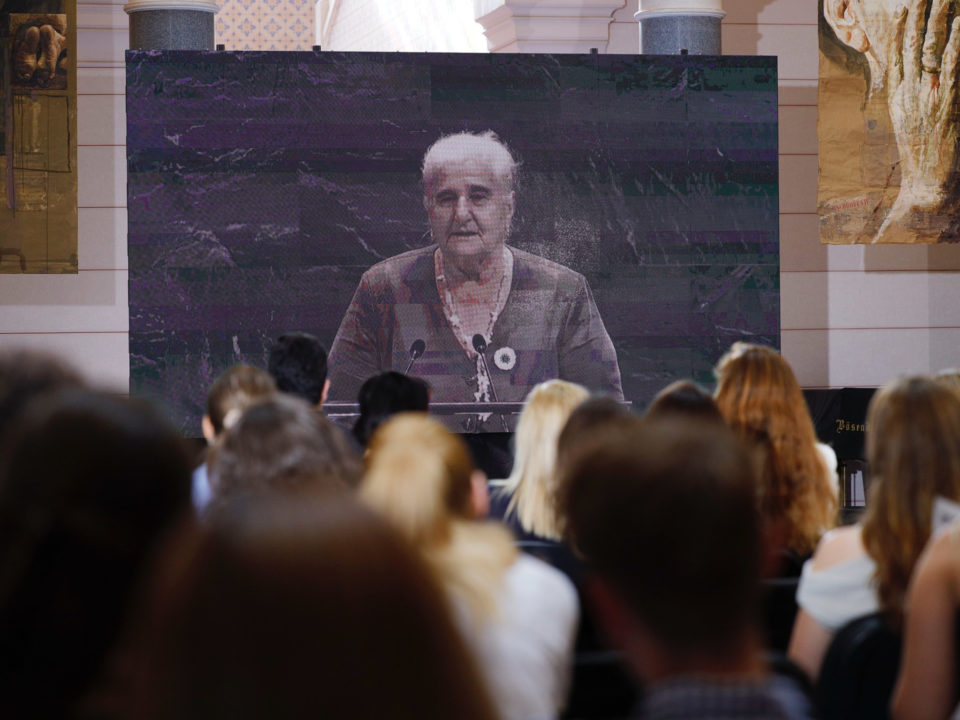
At the commemoration, Earle Courtenay Rattray, Chief of Staff, delivered an address on behalf of UN Secretary-General António Guterres. He was joined by Philemon Yang, President of the 79th session of the UN General Assembly; Ambassador Zlatko Lagumdžija, BiH’s Permanent Representative to the UN; Denis Bećirović, Bosniak member of the BiH Presidency; and Mirela Osmanović, a representative of the Srebrenica Memorial Center.
_______________
The international conference “Srebrenica 1995–2025: Dealing with the Past” was held with the support of the National Endowment for Democracy (NED), the Rockefeller Brothers Fund, the Sigrid Rausing Trust, the United Nations in BiH, BH Telecom, the Public Enterprise Vijećnica, the organization Pro Peace, the regional project “EU Support to Confidence Building in the Western Balkans,” and the OSCE Mission to Bosnia and Herzegovina.






